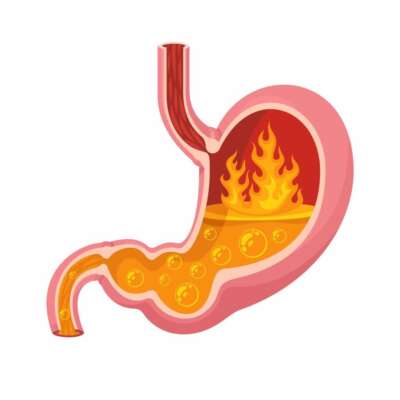
1. Proteins that cannot be broken down into amino acids are generally not useful in a nutritional sense. Undigested proteins cannot be utilized for essential functions including repairing muscles, building healthy skin, creating immune cells, etc.
2. Undigested proteins that pass through the stomach and small intestine can be fermented by pathogenic (bad) bacteria causing symptoms like gas, bloating and inflammation.
3. Any undigested proteins in the lower digestive tract have the potential to trigger immune reactions within the intestinal lining. Gluten is a primary example of this effect. Because gluten is a protein that is very difficult to digest, the immune system in the lining of the intestines gets exposed to the undigested gluten protein. Over time, the immune system may start to flag gluten as an enemy that needs to be attacked and eliminated, creating a cycle of immune dysregulation and inflammation. This is one way that people develop food allergies and intolerances over time.
4. Many nutrients can only be properly absorbed in the digestive tract when in the presence of stomach acid. This means that low stomach acid may lead to nutrient depletion, especially iron (ferritin), calcium and B12.
Stomach acid has another key responsibility, which is to kill any pathogens found in food, including bacteria, fungi and parasites. When stomach acid is sufficient, the body is actually well-equipped to handle “dirty” food covered in bacteria and other pathogens. When there is adequate stomach acid present, a bit of bacteria from the roots of a dirty carrot or a few parasites found in raw fish will be easily neutralized when it hits the harsh acidic environment of the stomach. If stomach acid is low, then these pathogens may take hold and become an infection in the intestines.
From a medical perspective, there are 2 major diagnoses, hypochlorhydria (low stomach acid) and achlorhydria (lack of stomach acid). Achlorhydria and hypochlorhydria may not actually have any symptoms, but the most common symptoms are feeling heavy after meals (especially after meals containing dense proteins like red meat), fatigue after meals, gas, bloating, multiple food sensitivities, recurrent food poisoning and acid reflux.
There are several common causes of low stomach acid. After age 40, the release of stomach acid naturally starts to decline. Low levels of magnesium and zinc in the body can impair stomach acid production. Long term use of acid reducing drugs like proton pump inhibitors and antacids can suppress stomach acid production. Stress diverts energy away from digestion, which reduces stomach acid secretion.
While we can’t control the age related decline in stomach acid, we are able to address the other common causes. Here are some tips on improving stomach acid production and overall digestion:
1. Mindful Eating – Always try to eat in as relaxed a state as possible. Try to take yourself away from any stressful environment, such as away from your desk at work. Prepare your body for the impending nourishment by doing some deep abdominal breathing. This can help to switch the body into its parasympathetic ‘rest and digest’ phase. Take time to eat your meal, thinking about the sight, taste and smell of the food. Eat slowly with small mouthfuls, chewing your food really well. Taking a short walk after eating can also help with digestion and calming the mind.
2. Address Stress – Learning about ways to cope with stressors can be extremely helpful. Explore all the options. Things like journaling, talk therapy, forest bathing, hypnotherapy, Tai Chi, qigong, breathwork, meditation, sound healing and more can all be ways to deal with the stress that happens in everyday life. Find what works for you or combine several therapies and use them regularly to help keep your body in the rest and digest phase that allows for optimal digestion and stomach acid production.
3. Eat a Nutrient Rich Diet – It’s the broken record that is played again and again, but it needs to be repeated. Your diet influences how your body functions. The body needs all the colors of the rainbow to stay healthy. A plant-forward diet, rich in phytonutrients and antioxidants, will nourish the stomach and help to keep it functioning optimally.
4. Work With a Holistic Practitioner – Holistic health practitioners frequently have answers that your allopathic doctor doesn’t. In East Asian Medicine, we look very closely at your overall diet and how it is translating into health problems. Ayurvedic practitioners also examine the diet. Homeopaths can analyze your situation and get you started on all natural remedies with no side effects. A naturopathic doctor or a functional medicine doctor can order lab tests that are not commonly done by primary care doctors and it can give a lot of insight into what may be causing your issues. Don’t rule out holistic medicine.
If you find yourself suffering from digestive issues like acid reflux, gas or bloating, it could be that you need to increase your stomach acid and address your stress levels. Please don’t let the media fool you into believing that stomach acid should be eliminated for anyone with digestive complaints. In fact, you can now see that the opposite is true. Stomach acid is so critical for our health meaning we should always take steps to cultivate and preserve it. .By understanding the importance of stomach acid and adopting supportive habits, you can improve your digestion and long-term health.

